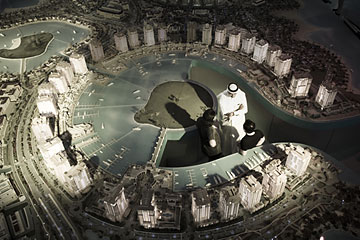
Arealestate sales office for Pearl-Qatar, a man-made-island project
(5 of 5)
Syria's Assad, however, laid bare Qatar's true vulnerabilities in a scathing attack in an Egyptian magazine, dismissing Qatar as a parvenu. "Those who have suddenly become wealthy after a very long period of poverty ... They imagine they can use their wealth to buy geography, history and a regional role," he said. As a target of Qatar's pressure, Assad has an interest in trying to belittle the upstart emirate. But his comments also hint at a bigger picture: in the centers of power in the Arab world, as in Europe and the U.S., the nouveau riche will always struggle to be taken seriously by the old guard. And so far, Qatar's wealth has yet to purchase lasting diplomatic influence. The nation's most recent foray into regional affairs, a conference in Doha designed to unite the Syrian opposition, managed to force an ungainly alliance, but the success was short-lived.
These setbacks are to be expected for a country just starting to flex its diplomatic muscle. Qatar may have been the first country to break the Gaza blockade, but it will never have the same clout as Egypt, which shares a border as well as a long history with Gaza. And that is Qatar's biggest problem. It has the ambition, but it is simply too small, too young, its pool of leaders too shallow to effectively achieve its vision. Qatar certainly has the cash to make waves, but until it develops a new generation of forceful diplomats to go along with those reserves, it won't have the momentum to ride them all the way to shore.
